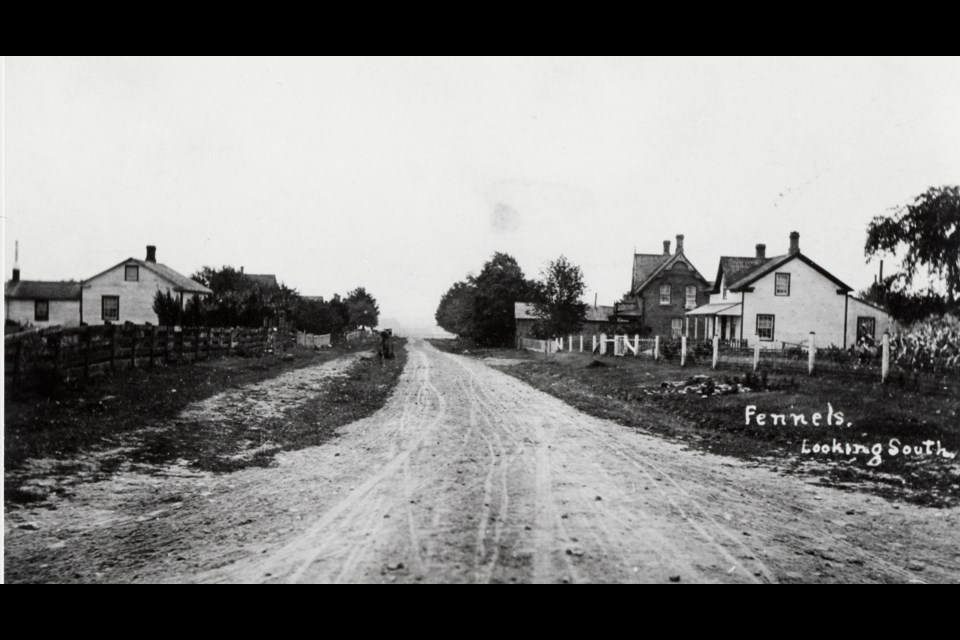George Peacock was a blacksmith by trade and was nearly peerless with the hammer and anvil.
He had good fortune in business and thereby assured he and his family a measure of prosperity few settlers could enjoy, but, sadly, his personal life was marred by tragedy, preventing him from fully enjoying his success.
The hamlet of Croxon’s Corners (now Fennel’s Corners) was centred around the intersection of what is now Yonge Street and County Road 89, a busy crossroads throughout the 19th century. Yonge Street was the main north-south thoroughfare linking Barrie and Innisfil with Bradford, Newmarket and, ultimately, Toronto. County Road 89 was arguably more important at the time, as farmers used it to deliver their produce to trains at Gilford.
All day long, wagons, stagecoaches, buggies, and men riding horses flowed through the hamlet. A man could make a good living off this traffic if he was skilled with the forge. After all, horses needed shoeing, wheels needed repairing, and harnesses needed mending. The community needed a blacksmith, Peacock reasoned in 1867, and he figured he was just the man for the job.
Peacock was born in Innisfil in 1844, one of eight children born to George W. and Jane Peacock. Also living with the family was George’s grandfather, a retired British army officer who had fought against Napoleon at the Battle of Waterloo. Young George admired this old warrior and loved hearing of his adventures as a soldier. It must have been an escape from the endless toil of tending to the family farm (north half of Lot 14, Concession 8), and it was probably from his grandfather he acquired his talent for spinning colourful yarns.
Rather than following his grandfather into soldiering or his father into farming, George apprenticed himself to a blacksmith and learned the ins and outs of the trade.
By 1867, he had learned all he could working under the watchful eye of the veteran smith, and it was time to set out on his own. Peacock purchased an acre of land in Croxon’s Corners facing Yonge Street, built a shop, and went into business for himself. Though the hours were long and the work was tiring, he was soon prospering. He attracted the attention of a local lass named Fanny and, in 1871, the two were married.
Sadly, it was not a long marriage. Fanny died a few years later, likely during childbirth, leaving an inconsolable Peacock to carry on with what now felt like an empty existence. But even as his personal life was crumbling, his business flourished.
This success was partly a result of his skill as a blacksmith, but it also had to do with the growth of the hamlet he served. By the late 1870s, Croxon’s Corners was thriving, boasting two hotels, a store, an Orange Lodge, a Methodist church, and a post office.
Blacksmiths, of course, were responsible for much more than shoeing horses. In addition, they repaired farming implements such as plows and furrows, crafted a wide variety of tools, and made household items like hinges, nails and pots.
Peacock eventually found happiness again, with Emily Hughes. They had four children together: Melville (1882), Flossie (1887), Phyllis (1890) and Russell (1892). Sadly, he had to bury a wife prematurely once again as Emily died suddenly in 1900.
By this point, Peacock was aging rapidly. The years of working the forge had taken their toll on his body and he was racked by crippling arthritis. Still, he got up every day and headed to the smithy, though most of the work was done by the apprentices to whom he passed on his knowledge.
One of these apprentices, William J. Parkes, impressed Peacock so greatly, he allowed the man to not only take over the business but also marry his daughter, Flossie.
Peacock died a few years later, on Feb. 8, 1908, and is interred at Clement’s Burying Ground. His blacksmith shop carried on, first under Parkes, and then under a succession of other smiths, until the 1930s.
By then, Croxon’s Corners was Fennell’s Corners, its glory days past, and the era of the blacksmith was all but over.



